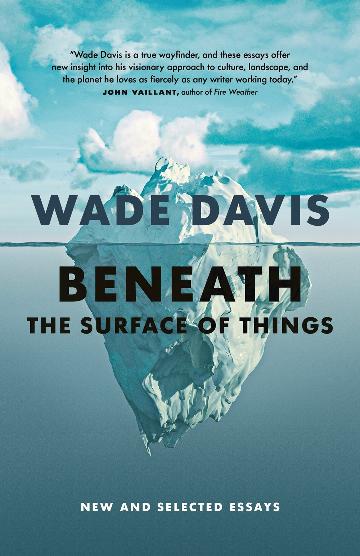Wade Davis
Beneath The Surface Of Things
Beneath The Surface Of Things
Couldn't load pickup availability
Gabi's Review
Wade Davis is a Canadian cultural anthropologist, ethnobotanist, photographer and writer whose accolades are too extensive to list, and whose writing is too interesting and thought-provoking to miss. His previous book Wayfinders explored decades of discovery and awe he experienced when living with and studying remnant indigenous cultures across the globe. It is impossible to read Wayfinders and not be enriched its recounting of the resilience and genius of these human societies in their adaptations and cultural framings of their world. Davis’s new book is more provocative and urgent: Beneath the Surface of Things and is a collection of essays on the state of the world, including a viral piece written for Rolling Stone Magazine about contemporary America.
Some essays deal with the issue of race; an issue even more crucial in the lead-up to the US election in November 2024. The essay ‘Why Anthropology Matters’ reminds us that “[r]ace is a cultural construct, derived not from biology but born in the realm of ideas’. Davis is particularly concerned with the urgent need to protect and preserve the vast knowledge of the natural world held by indigenous people. His essay ‘New Word for Indigenous’ presents a strong argument for replacing the limited umbrella of 'indigenous' with a variety of terms that better represents the individual genius of the diversity of ancient cultures. Another essay, ‘The Unravelling of America,’ details the deterioration of the perception of American exceptionalism on the world stage in the light of the handling of the global Covid Pandemic.
The essay ‘The Divine Leaf of Mortality’ reminds us of the highly distinctive ways in which human societies interpret the world. Davis uses as an example the significance for the people of the Andes of the coco leaf. The leaf has immense symbolic and spiritual value and is also their highest dietary source of calcium. The American ‘War on Drugs' has seen the decimation of cocoa plantations: its vilification has become a political weapon, threatening culture and nutrition in parts of Peru.
Davis understands that the extinction crisis threating animal, plant and insect species is a result of modern human habitation practices. Reading his work reminds us that there are pockets of remnant cultures where a reverence for nature and the use of sustainable environmental practices was instantiated into lore. His accounts of indigenous societies remind us that societies behave according to their organisational values, and that diversity implies choice. While it might be the case that we get the governments we deserve, the choice is always there to use more environmentally and spiritually values though which to organise our societies.
Publisher's Review
The essays in this collection came about during the unhurried months when one who had traveled incessantly was obliged to stay still, even as events flared on all sides in a world that never stops moving. Wade Davis brings his unique cultural perspective to such varied topics as the demonisation of coca, the sacred plant of the Inca; the Great War and the birth of modernity; the British conquest of Everest; the endless conflict in the Middle East; reaching beyond climate fear and trepidation; on the meaning of the sacred. His essay, 'The Unraveling of America', first published in Rolling Stone, attracted five million readers and generated 362 million social media impressions. Media interest in the story was sustained over many weeks, with interview requests coming in from 23 countries.
The anthropological lens, as Davis demonstrates, reveals what lies beneath the surface of things, allowing us to see, and to seek, the wisdom of the middle way, a perspective of promise and hope that all of the essays in this collection aspire to convey.
'Wade Davis has a gift for saying the unsayable. He's a fearless explorer in the intellectual world, as in the physical. His refusal to embrace conventional wisdom on climate change, for example, and instead think through the issue for himself, is a model of independent thinking. Even when I disagree with Wade, as with some of his bleak comments about the United States, I'm grateful for his voice. We usually live on the surface of ideas when we talk about issues such as war and racism; Wade takes us far deeper.' David Ignatius, columnist and associate editor, Washington Post
'Wade Davis is a true wayfinder, and these essays offer new insight into his visionary approach to culture, landscape, and the planet he loves as fiercely as any writer working today.' - John Vaillant, author of Fire Weather
Share


